Israel PM Netanyahu coalition member calls for Hawara to be 'burned and closed'
The New Arab Staff
28 February, 2023
Zvika Foget, a member of the far-right Otzma Yehudit party, spoke approvingly of Sunday's settler violence against Palestinians as 'deterrence'.

Israeli settlers burned dozens of homes and cars in the occupied West Bank on Sunday
The New Arab Staff
28 February, 2023
Zvika Foget, a member of the far-right Otzma Yehudit party, spoke approvingly of Sunday's settler violence against Palestinians as 'deterrence'.

Israeli settlers burned dozens of homes and cars in the occupied West Bank on Sunday
[Nasser Ishtayeh/SOPA Images/LightRocket via Getty Images]
A senior member of Israeli Prime Minister Benjamin Netanyahu's governing coalition called for Hawara to be "burned and closed", whilst approving of a settler rampage in the same occupied West Bank village on Sunday.
"Yesterday a terrorist came from Huwara – Hawara is closed and burnt. That is what I want to see. Only thus can we obtain deterrence," said Otzma Yehudit (Jewish Power) party in an interview with Radio Galey Israel.
"The act that the residents of Judea and Samaria (referring to the illegal settlers living in the occupied West Bank) carried out yesterday is the strongest deterrent that the State of Israel has had since Operation Defensive Shield. After a murder like yesterday, villages should burn when the IDF [Israeli military] does not act."
Operation Defensive Shield was the Israeli assault in the occupied West Bank during the Second Intifada in 2002 when nearly 500 Palestinians were killed.
He also said in an interview with Israeli Army Radio that he "looks favourably upon" the results of violence perpetrated by Israeli settlers, who, flanked by members of the Israeli army, had killed one Palestinian and set dozens of homes and vehicles on fire in Hawara on Sunday.
"The effect of deterrence that was achieved yesterday following these so-called 'pogroms' hadn't been achieved in the West Bank since Operation Defensive Shield," he said, referring to the Israeli army’s actions during the Second Intifada in 2002 when several Palestinian towns and cities in the West Bank were invaded and nearly 500 Palestinians killed.
The extreme-right Otzma Yehudit party is led by Israel's National Security Minister Itamar Ben Gvir who has repeatedly encouraged settler violence against Palestinians and asserted that Israel should annex settlements in the West Bank, which are illegal under international law.
Israeli opposition leader Yair Lapid criticised Fogel’s remarks, saying: "This is not a full right-wing government, this is a full-anarchist government. MK Fogel must go to jail for inciting terror."
Settlers rampaged through Hawara on Monday, starting fires and attacking Palestinian homes. At least one Palestinian was killed on Sunday and Monday, and more than 350 Palestinians were injured, most suffering from tear gas inhalation, the Palestinian Red Crescent Society said.
The settler violence came after two Israelis were shot dead by a Palestinian in the West Bank, just days after an Israeli massacre in Nablus, which left at least 11 Palestinians killed.
Sixty-three Palestinians - more than one a day - have been killed by Israeli forces so far this year.
A senior member of Israeli Prime Minister Benjamin Netanyahu's governing coalition called for Hawara to be "burned and closed", whilst approving of a settler rampage in the same occupied West Bank village on Sunday.
"Yesterday a terrorist came from Huwara – Hawara is closed and burnt. That is what I want to see. Only thus can we obtain deterrence," said Otzma Yehudit (Jewish Power) party in an interview with Radio Galey Israel.
"The act that the residents of Judea and Samaria (referring to the illegal settlers living in the occupied West Bank) carried out yesterday is the strongest deterrent that the State of Israel has had since Operation Defensive Shield. After a murder like yesterday, villages should burn when the IDF [Israeli military] does not act."
Operation Defensive Shield was the Israeli assault in the occupied West Bank during the Second Intifada in 2002 when nearly 500 Palestinians were killed.
He also said in an interview with Israeli Army Radio that he "looks favourably upon" the results of violence perpetrated by Israeli settlers, who, flanked by members of the Israeli army, had killed one Palestinian and set dozens of homes and vehicles on fire in Hawara on Sunday.
Foget said the violence - which was described as a 'pogrom' - acted as a 'deterrent'.
"The effect of deterrence that was achieved yesterday following these so-called 'pogroms' hadn't been achieved in the West Bank since Operation Defensive Shield," he said, referring to the Israeli army’s actions during the Second Intifada in 2002 when several Palestinian towns and cities in the West Bank were invaded and nearly 500 Palestinians killed.
The extreme-right Otzma Yehudit party is led by Israel's National Security Minister Itamar Ben Gvir who has repeatedly encouraged settler violence against Palestinians and asserted that Israel should annex settlements in the West Bank, which are illegal under international law.
Palestinians count cost of Israeli violence in West Bank
Israeli opposition leader Yair Lapid criticised Fogel’s remarks, saying: "This is not a full right-wing government, this is a full-anarchist government. MK Fogel must go to jail for inciting terror."
Settlers rampaged through Hawara on Monday, starting fires and attacking Palestinian homes. At least one Palestinian was killed on Sunday and Monday, and more than 350 Palestinians were injured, most suffering from tear gas inhalation, the Palestinian Red Crescent Society said.
The settler violence came after two Israelis were shot dead by a Palestinian in the West Bank, just days after an Israeli massacre in Nablus, which left at least 11 Palestinians killed.
Sixty-three Palestinians - more than one a day - have been killed by Israeli forces so far this year.
Israeli military calls settler attacks on Palestinians ‘actions of terror’ after weekend of violence
By Hadas Gold, CNN
Mon February 27, 2023

An aerial view shows a building and cars burnt in an attack by Israeli settlers, near Huwara in the West Bank, on February 27, 2023.Ammar Awad/Reuters
JerusalemCNN —
The Israel Defense Forces (IDF) sees the previous day’s attacks by Israeli settlers against Palestinians in the West Bank as “actions of terror,” an IDF official said Monday, as tensions in the region simmered after a weekend of violence.
At least one Palestinian man was killed, a Palestinian fire engine was stoned by a crowd of about 50 settlers, and other Palestinians were injured with stones or metal bars, Palestinian medical officials said Sunday, blaming Israeli settlers in the West Bank.
The attacks followed the fatal shooting of two Israeli brothers earlier in the day in the town of Huwara, south of Nablus in the Israeli-occupied West Bank, just days after a massive Israeli military raid into Nablus in search of wanted militants left at least 11 Palestinians dead.
“Last night there was revenge activity done by people that live in the area. I wanted to say we see these actions as actions of a terror, these violent riots,” the IDF official said, asking not to be named due to the sensitivity of the situation. “It’s been a horrible night,” the official added.
The official said the reason the IDF was sending three additional battalions to the area was to keep the Palestinians and Israelis apart.
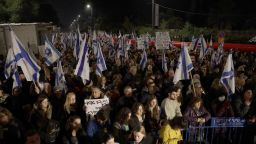
About 160,000 people protest against Netanyahu's judicial overhaul in Tel Aviv
“More forces will de-escalate” the situation, the official said. “This morning we’ve sent in another Givati (reconnaissance) battalion – the Givati Special Forces battalion – into the area in addition to two Border Patrol companies, basically trying to de-escalate and keep the two sides apart.”
Israel’s Minister of Defense Yoav Gallant vowed to arrest the individual or individuals who killed the settlers and called for calm while allowing military and security forces to work and apprehend the perpetrators.
“It is neither legitimate nor possible to operate individually,” Gallant said Monday, while visiting the location where the incident took place. “We cannot allow a situation in which citizens take the law into their hands. I call on everyone to follow law and order and to trust the IDF and security forces everywhere, across the country.”
The IDF detained eight people in connection with the attacks in Huwara, some of whom have since been released, Israel Police spokesman Dean Elsdunne told CNN Monday.
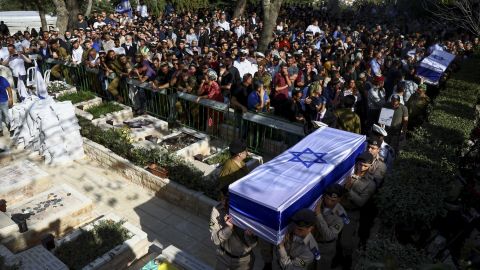
People attend the funeral of the brothers Hillel and Yagal Yaniv at the Mount Herzl
Cycle of violence
Sameh Hamdallah Mahmoud Aqtash, 37, was shot in the abdomen and killed in the town of Za’tara, between Huwara and the Israeli settlement of Kfar Tapuach, the Palestinian Ministry of Health said Sunday night. In Huwara itself, at least one person was stabbed and another assaulted with an iron bar, the Palestinian Red Crescent said.
The Israeli settlers who were killed earlier were named as brothers Hillel Menachem Yaniv, 21, and Yagel Yaakov Yaniv, 19, according to the local settler council.
Video from the scene showed that their car had crossed a median, and hit a vehicle going the other direction, suggesting they were shot while driving.
Late Sunday, the IDF announced that the older brother, Hillel, was a serving soldier and expressed condolences in a statement.
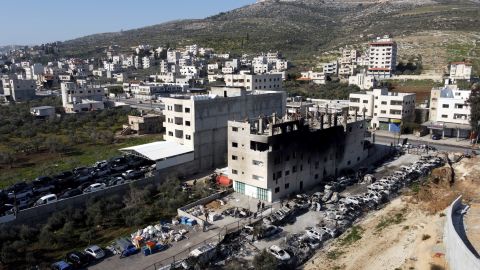
A view over the town of Huwara on February 27.Amir Levy/Getty Images
Peace talks
Following rare talks on Sunday brokered by Jordan, Egypt and the United States, Israeli and Palestinian representatives “affirmed their commitment to all previous agreements between them, and to work towards a just and lasting peace.”
Israel and the Palestinian Authority confirmed their “joint readiness and commitment to immediately work to end unilateral measures for a period of 3-6 months. This includes an Israeli commitment to stop discussion of any new settlement units for 4 months and to stop authorization of any outposts for 6 months,” a joint statement read.
However, in response to the announcement of a halt on settlement construction, far-right Religious Zionism party leader Bezalel Smotrich firmly rejected a pause, “even for one day.”
In a post on Twitter, the Israeli finance minister appeared out of alignment with his government, writing: “There will not be a freeze on settlement building and development, not even for one day (this is under my authority). The IDF will continue to act to counter terrorism in all areas of Judea and Samaria without any limitations (we will reaffirm this in the cabinet). It’s very simple.”
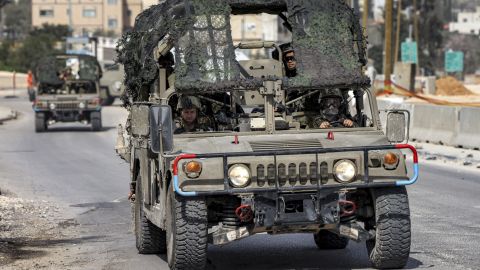
Israeli soldiers ride in a military vehicle in Huwara, near Nablus in the West Bank, on Monday.
Israeli cabinet approves bill allowing death penalty for ‘terrorists’
Also on Sunday, Israel’s cabinet approved a proposed law to impose the death penalty on “terrorists.” It is officially a private member’s bill sponsored by the far-right National Security Minister Itamar Ben Gvir, rather than government-backed legislation.
The law would give courts the power to “impose the death penalty on those who have committed the crime of murder on nationalistic grounds against the citizens of Israel,” a statement from Prime Minister Benjamin Netanyahu and Ben Gvir said.
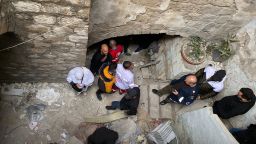
Israeli incursion shatters lives in ancient Middle Eastern city
After a preliminary vote in the Knesset, or parliament, Israel’s political-security cabinet will next discuss the language in the bill, before it goes to the committee stage. If it passes the committee stage, it will require three Knesset readings to become law.
There have been previous attempts to introduce the death penalty in 2016 and 2018, according to the Israel Democracy Institute, but they did not become law.
In response to the moves, the Palestinian government on Monday condemned “in the strongest terms” the Israeli cabinet’s approval, according to a statement from the Palestinian Ministry of Foreign Affairs.
“The death penalty violates the fundamental rights of the Palestinian people to life, non-discrimination, and self-determination. It is a cruel, barbaric, and inhumane bill rooted in Jewish supremacy and precisely aimed to deny the Palestinian people their right to exist and their humanity,” it said, while also calling on the international community to take “concrete actions to pressure Israel to rescind its bill.”
CNN’s Amir Tal, Abeer Salman, Caroline Faraj, Hamdi Alkhshali, Lauren Said-Moorhouse and Kareem El Damanhoury contributed to this report.
By Hadas Gold, CNN
Mon February 27, 2023

An aerial view shows a building and cars burnt in an attack by Israeli settlers, near Huwara in the West Bank, on February 27, 2023.Ammar Awad/Reuters
JerusalemCNN —
The Israel Defense Forces (IDF) sees the previous day’s attacks by Israeli settlers against Palestinians in the West Bank as “actions of terror,” an IDF official said Monday, as tensions in the region simmered after a weekend of violence.
At least one Palestinian man was killed, a Palestinian fire engine was stoned by a crowd of about 50 settlers, and other Palestinians were injured with stones or metal bars, Palestinian medical officials said Sunday, blaming Israeli settlers in the West Bank.
The attacks followed the fatal shooting of two Israeli brothers earlier in the day in the town of Huwara, south of Nablus in the Israeli-occupied West Bank, just days after a massive Israeli military raid into Nablus in search of wanted militants left at least 11 Palestinians dead.
“Last night there was revenge activity done by people that live in the area. I wanted to say we see these actions as actions of a terror, these violent riots,” the IDF official said, asking not to be named due to the sensitivity of the situation. “It’s been a horrible night,” the official added.
The official said the reason the IDF was sending three additional battalions to the area was to keep the Palestinians and Israelis apart.

About 160,000 people protest against Netanyahu's judicial overhaul in Tel Aviv
“More forces will de-escalate” the situation, the official said. “This morning we’ve sent in another Givati (reconnaissance) battalion – the Givati Special Forces battalion – into the area in addition to two Border Patrol companies, basically trying to de-escalate and keep the two sides apart.”
Israel’s Minister of Defense Yoav Gallant vowed to arrest the individual or individuals who killed the settlers and called for calm while allowing military and security forces to work and apprehend the perpetrators.
“It is neither legitimate nor possible to operate individually,” Gallant said Monday, while visiting the location where the incident took place. “We cannot allow a situation in which citizens take the law into their hands. I call on everyone to follow law and order and to trust the IDF and security forces everywhere, across the country.”
The IDF detained eight people in connection with the attacks in Huwara, some of whom have since been released, Israel Police spokesman Dean Elsdunne told CNN Monday.

People attend the funeral of the brothers Hillel and Yagal Yaniv at the Mount Herzl
military cemetery in Jerusalem on Monday.Ronen Zvulun/Reuters
Cycle of violence
Sameh Hamdallah Mahmoud Aqtash, 37, was shot in the abdomen and killed in the town of Za’tara, between Huwara and the Israeli settlement of Kfar Tapuach, the Palestinian Ministry of Health said Sunday night. In Huwara itself, at least one person was stabbed and another assaulted with an iron bar, the Palestinian Red Crescent said.
The Israeli settlers who were killed earlier were named as brothers Hillel Menachem Yaniv, 21, and Yagel Yaakov Yaniv, 19, according to the local settler council.
Video from the scene showed that their car had crossed a median, and hit a vehicle going the other direction, suggesting they were shot while driving.
Late Sunday, the IDF announced that the older brother, Hillel, was a serving soldier and expressed condolences in a statement.

A view over the town of Huwara on February 27.Amir Levy/Getty Images
Peace talks
Following rare talks on Sunday brokered by Jordan, Egypt and the United States, Israeli and Palestinian representatives “affirmed their commitment to all previous agreements between them, and to work towards a just and lasting peace.”
Israel and the Palestinian Authority confirmed their “joint readiness and commitment to immediately work to end unilateral measures for a period of 3-6 months. This includes an Israeli commitment to stop discussion of any new settlement units for 4 months and to stop authorization of any outposts for 6 months,” a joint statement read.
However, in response to the announcement of a halt on settlement construction, far-right Religious Zionism party leader Bezalel Smotrich firmly rejected a pause, “even for one day.”
In a post on Twitter, the Israeli finance minister appeared out of alignment with his government, writing: “There will not be a freeze on settlement building and development, not even for one day (this is under my authority). The IDF will continue to act to counter terrorism in all areas of Judea and Samaria without any limitations (we will reaffirm this in the cabinet). It’s very simple.”

Israeli soldiers ride in a military vehicle in Huwara, near Nablus in the West Bank, on Monday.
Ronaldo Schemidt/AFP/Getty Images
Israeli cabinet approves bill allowing death penalty for ‘terrorists’
Also on Sunday, Israel’s cabinet approved a proposed law to impose the death penalty on “terrorists.” It is officially a private member’s bill sponsored by the far-right National Security Minister Itamar Ben Gvir, rather than government-backed legislation.
The law would give courts the power to “impose the death penalty on those who have committed the crime of murder on nationalistic grounds against the citizens of Israel,” a statement from Prime Minister Benjamin Netanyahu and Ben Gvir said.

Israeli incursion shatters lives in ancient Middle Eastern city
After a preliminary vote in the Knesset, or parliament, Israel’s political-security cabinet will next discuss the language in the bill, before it goes to the committee stage. If it passes the committee stage, it will require three Knesset readings to become law.
There have been previous attempts to introduce the death penalty in 2016 and 2018, according to the Israel Democracy Institute, but they did not become law.
In response to the moves, the Palestinian government on Monday condemned “in the strongest terms” the Israeli cabinet’s approval, according to a statement from the Palestinian Ministry of Foreign Affairs.
“The death penalty violates the fundamental rights of the Palestinian people to life, non-discrimination, and self-determination. It is a cruel, barbaric, and inhumane bill rooted in Jewish supremacy and precisely aimed to deny the Palestinian people their right to exist and their humanity,” it said, while also calling on the international community to take “concrete actions to pressure Israel to rescind its bill.”
CNN’s Amir Tal, Abeer Salman, Caroline Faraj, Hamdi Alkhshali, Lauren Said-Moorhouse and Kareem El Damanhoury contributed to this report.
Finance Minister Bezalel Smotrich among the senior politicians seen supporting the unprecedented attacks on Palestinian towns in the West Bank
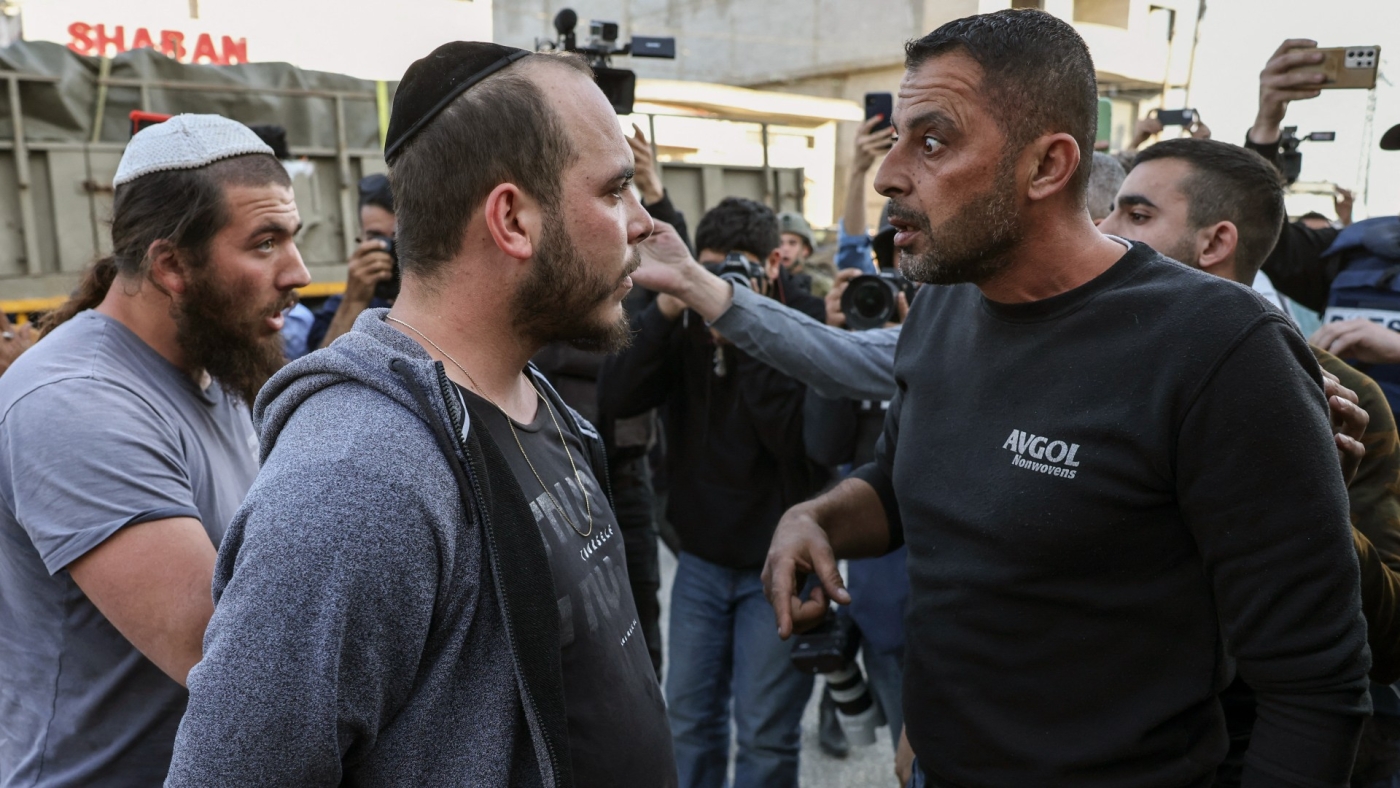
Israeli settlers confront a Palestinian in the West Bank town of Huwwara, 27 February (AFP)
By Elis Gjevori
Published date: 27 February 2023

Hours before Israeli settlers set the occupied West Bank town of Huwwara ablaze on Sunday, several Israeli politicians called for the Palestinian village to be wiped out.
In a since deleted tweet, David Ben Zion, the deputy head of the Samaria Council that governs illegal settlements in the northern West Bank, called for Israeli politicians to show no mercy and that the “village of Huwwara should be erased today”.
The tweet was liked by the country’s Finance Minister Bezalel Smotrich, and followed the fatal shooting of two Israeli settlers carried out by a suspected Palestinian gunman on Sunday in the town.
Ben Zion, who represents more than a dozen Israeli settlements in the occupied West Bank including where the attack occurred, later said that he had written the comments in the “heat of the moment”.
Smotrich’s liking of the tweet by Ben Zion also drew condemnation and was viewed by some as the state sanctioning of mob violence.
“Our minister of finance, minister of the defence ministry and a member of the security cabinet supports erasing an entire village when the only sin of its inhabitants is that they are Palestinians,” Shir Nosatzki, a social media entrepreneur, said on Twitter.
On Sunday, Smotrich escalated rhetoric himself, demanding that the Israeli army "hit Palestinian cities, with tanks and helicopters, mercilessly, in a way that would convey that the owner of the house has gone mad".
With buildings in Huwwara still smouldering and the Palestinian gunman still on the run, Smotrich took to Twitter on Sunday evening to promote a thread that recommended the “collective punishment of the terrorist's family and environment as an effective and necessary tool in asymmetric warfare”. Collective punishment of occupied populations is illegal under international law.
At least one Palestinian was killed and nearly 400 wounded in the attacks on Huwwara and other West Bank towns and villages, Palestinian health officials said. Settlers completely burnt down at least 35 homes and 40 others were partially damaged, and many of the buildings were set on fire while their Palestinian inhabitants sheltered inside. More than 100 cars were burnt or otherwise destroyed.
'Act with an iron fist'
Smotrich and Ben Zion were not the only Israeli leaders, politicians and commentators pouring fuel on the fire and seeking to legitimise the actions of the settlers.
Aryeh Erlich, an editor at the ultra-orthodox magazine Mishpacha, downplayed the riots, by writing:
“The thought now should not be of boys whose blood boiled after seeing the bodies of their two friends lying in their blood on the road.”
“Our minister of finance, minister of the defence ministry and a member of the security cabinet supports erasing an entire village when the only sin of its inhabitants is that they are Palestinians,” Shir Nosatzki, a social media entrepreneur, said on Twitter.
On Sunday, Smotrich escalated rhetoric himself, demanding that the Israeli army "hit Palestinian cities, with tanks and helicopters, mercilessly, in a way that would convey that the owner of the house has gone mad".
With buildings in Huwwara still smouldering and the Palestinian gunman still on the run, Smotrich took to Twitter on Sunday evening to promote a thread that recommended the “collective punishment of the terrorist's family and environment as an effective and necessary tool in asymmetric warfare”. Collective punishment of occupied populations is illegal under international law.
At least one Palestinian was killed and nearly 400 wounded in the attacks on Huwwara and other West Bank towns and villages, Palestinian health officials said. Settlers completely burnt down at least 35 homes and 40 others were partially damaged, and many of the buildings were set on fire while their Palestinian inhabitants sheltered inside. More than 100 cars were burnt or otherwise destroyed.
'Act with an iron fist'
Smotrich and Ben Zion were not the only Israeli leaders, politicians and commentators pouring fuel on the fire and seeking to legitimise the actions of the settlers.
Aryeh Erlich, an editor at the ultra-orthodox magazine Mishpacha, downplayed the riots, by writing:
“The thought now should not be of boys whose blood boiled after seeing the bodies of their two friends lying in their blood on the road.”
Whereas Limor Son Har-Melech from Jewish Power, the party of far-right National Security Minister Itamar Ben Gvir that is part of the ruling coalition, called the riots “the righteous cry of hundreds of Samaria residents who came out to protest and demand security”.
Similarly, another MP from Prime Minister Benjamin Nentanyahu’s Likud party sympathised with the settlers, urging the state to “act with an iron fist!”.
As videos of violent lawlessness spread on social media, with Israeli forces seemingly unwilling to stop rioters, settlers were more than happy to share their plans.
One settler filmed himself in Huwwara as Palestinian houses burned in the background, predicting the coming end of the Israeli army and the transition to Jewish militias, going on to laud the “very exciting revenge operation”.
'Immune to the law'
Yet the scenes also frightened many on the right, even drawing a comparison to Kristallnacht, the "Night of Broken Glass", the state-directed pogrom against Jews carried out by the Nazi Party in Germany in 1938, from a seasoned commentator.
“The government needs to decide if it acts as a sovereign in the territories, if it is determined to impose law and order on Arabs and Jews alike, or if it serves as a fig leaf for the hilltop youth,” wrote Nahum Barnea for the right-wing Israeli news outlet Ynet, referring to the radical settler group.
While Israeli settlers have regularly committed attacks against Palestinians in the West Bank, Sunday's attacks were “almost unprecedented”, warned Barnea.
Rioting settlers feel “immune to the law. Fear of the state does not apply to them,” said Barnea.
“Smotrich and Ben-Gvir observe the rioters in Huwwara and probably remember themselves: when they were their age, they behaved like them.”

With Huwwara largely abandoned by its Palestinian residents, Israeli settlers rallied in the town, singing in unison under the protection of the army.
“Huwwara is closed and burned. That is what I want to see. Only thus can we obtain deterrence,” said Jewish Power politician Zvika Fogel, celebrating last night’s riots.
At least 62 Palestinians have been killed by Israelis this year, at a rate of more than one fatality per day. Meanwhile, 12 Israeli civilians and one police officer have been killed by Palestinians in the same period.
This follows a steep increase in violence in 2022 when at least 167 Palestinians were killed in the West Bank and East Jerusalem, the highest death toll in those territories in a single year since the Second Intifada. Palestinian attacks killed 30 Israelis last year.
Similarly, another MP from Prime Minister Benjamin Nentanyahu’s Likud party sympathised with the settlers, urging the state to “act with an iron fist!”.
As videos of violent lawlessness spread on social media, with Israeli forces seemingly unwilling to stop rioters, settlers were more than happy to share their plans.
One settler filmed himself in Huwwara as Palestinian houses burned in the background, predicting the coming end of the Israeli army and the transition to Jewish militias, going on to laud the “very exciting revenge operation”.
'Immune to the law'
Yet the scenes also frightened many on the right, even drawing a comparison to Kristallnacht, the "Night of Broken Glass", the state-directed pogrom against Jews carried out by the Nazi Party in Germany in 1938, from a seasoned commentator.
“The government needs to decide if it acts as a sovereign in the territories, if it is determined to impose law and order on Arabs and Jews alike, or if it serves as a fig leaf for the hilltop youth,” wrote Nahum Barnea for the right-wing Israeli news outlet Ynet, referring to the radical settler group.
'Huwwara is closed and burned. That is what I want to see. Only thus can we obtain deterrence'
- Zvika Fogel, Jewish Power politician
While Israeli settlers have regularly committed attacks against Palestinians in the West Bank, Sunday's attacks were “almost unprecedented”, warned Barnea.
Rioting settlers feel “immune to the law. Fear of the state does not apply to them,” said Barnea.
“Smotrich and Ben-Gvir observe the rioters in Huwwara and probably remember themselves: when they were their age, they behaved like them.”

With Huwwara largely abandoned by its Palestinian residents, Israeli settlers rallied in the town, singing in unison under the protection of the army.
“Huwwara is closed and burned. That is what I want to see. Only thus can we obtain deterrence,” said Jewish Power politician Zvika Fogel, celebrating last night’s riots.
At least 62 Palestinians have been killed by Israelis this year, at a rate of more than one fatality per day. Meanwhile, 12 Israeli civilians and one police officer have been killed by Palestinians in the same period.
This follows a steep increase in violence in 2022 when at least 167 Palestinians were killed in the West Bank and East Jerusalem, the highest death toll in those territories in a single year since the Second Intifada. Palestinian attacks killed 30 Israelis last year.
Huwwara riots: Eyewitness account of Israeli settler attack on Palestinian town
Hussein al-Suwaiti describes scenes of violent Israeli settler attack across his town, which has left cars, buildings and scrapyards burned to the ground
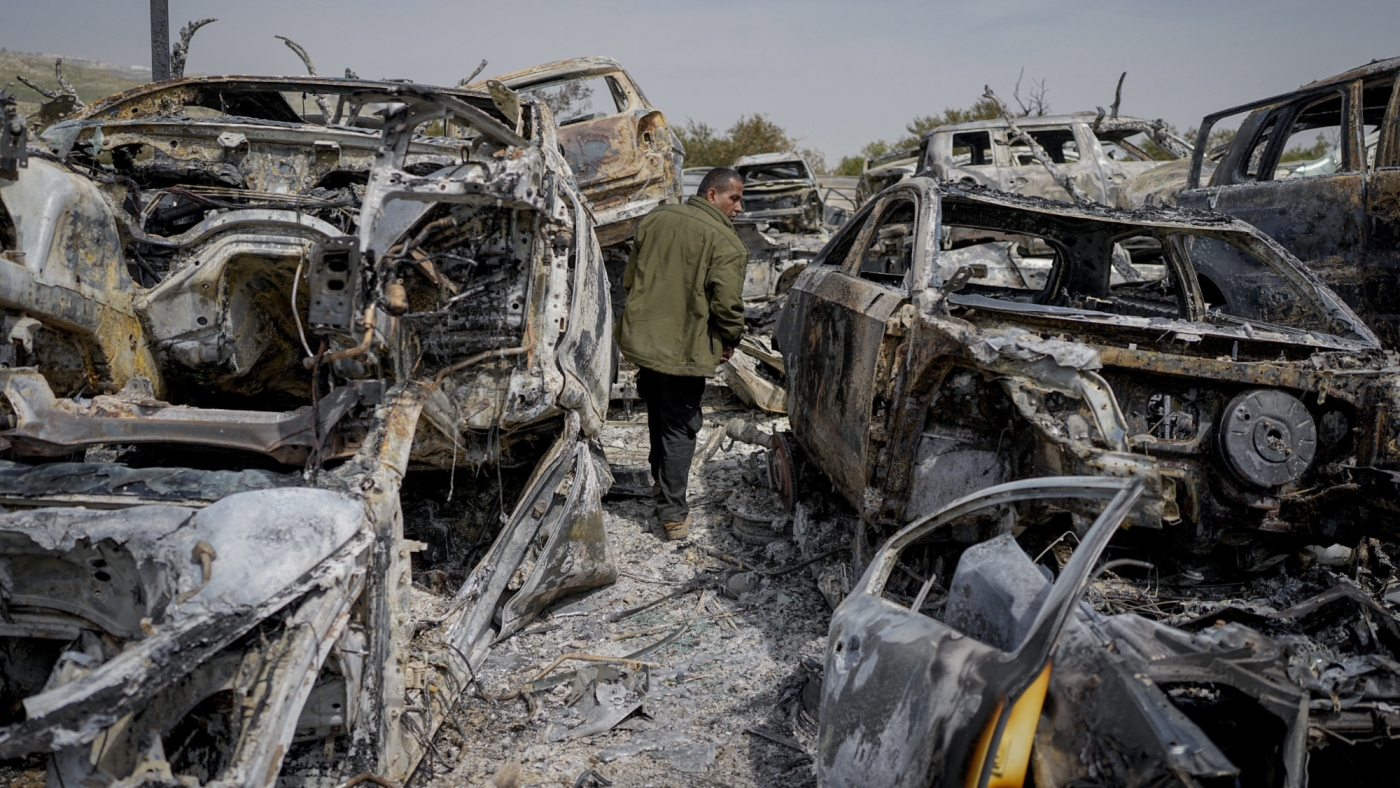
A Palestinian man walks between scorched cars in a scrapyard, in the town of Huwwara, near the West Bank city of Nablus, on 27 February 2023 (AP)
By Hussein al-Suwaiti in
Huwwara, occupied Palestine
Published date: 27 February 2023 19:05 UTC | Last update: 14 hours 51 mins ago
As told to Ola Marshoud.
Israeli settlers had gathered at an intersection of a settlement, descended on Huwwara on foot, and set the whole town on fire.
They had come holding flags and seeking revenge because earlier that day, a Palestinian shot dead two Israeli settlers.
The settlers burned homes, shops, and scrapyards. They moved towards the town's mainstreet, where we live, and first attacked our neighbours. They burned my neighbour's car showroom, and the scrapyard facing it.

We couldn't do anything except pray, scream for help, and shout at the settlers
I yelled towards the soldiers and told them that the settlers were trying to force their way into my house. They pointed their weapons at me and told me to go inside.
No one was there to help. The fire was inching closer, and we were going to burn inside our home. My biggest fear was that they'd burn my car, which I had parked in the courtyard, in front of our entrance. If they had, we would have been stuck in the house.
I wrote a distressing message on Facebook: For the love of God, we need an ambulance and a fire truck.
The fire had taken hold of the scrapyard. Palestinian officials arrived at the scene and called on us and our neighbours to leave our buildings. They put us in Palestinian ambulances and took us to hospital.
My seven-year-old had to be put on oxygen from smoke inhilation, while I received emergency treatment because I have asthma.
Audacity
I have three other children, aged 15, 14, and 13. The panic that we felt cannot be described.
The attack yesterday has compromised the security one feels in their own home, in their own town. We are in a state of alert now and expect them to return at any moment.
Before the attack started, settlers had come to Huwwara with their families, including their children, some of whom were in strollers, and walked around the town.

When I yelled out to the soldiers that we couldn't breathe, they pointed their guns at me
The army is behind their audacity.
The settlers know they are backed by soldiers, so of course, they will do whatever they want to do. They entered the town under the protection of the army, which had given them the green light.
In the past, when soldiers arrive at the scene, they contain the situation and the settlers disperse. Not this time.
When I yelled out to the soldiers that we couldn't breathe, they pointed their guns at me. We need to have international observers on the ground.
As the saying goes, "the judge and the executioner are one and the same". There's no one to save us.
Hussein al-Suwaiti describes scenes of violent Israeli settler attack across his town, which has left cars, buildings and scrapyards burned to the ground

A Palestinian man walks between scorched cars in a scrapyard, in the town of Huwwara, near the West Bank city of Nablus, on 27 February 2023 (AP)
By Hussein al-Suwaiti in
Huwwara, occupied Palestine
Published date: 27 February 2023 19:05 UTC | Last update: 14 hours 51 mins ago
As told to Ola Marshoud.
Israeli settlers had gathered at an intersection of a settlement, descended on Huwwara on foot, and set the whole town on fire.
They had come holding flags and seeking revenge because earlier that day, a Palestinian shot dead two Israeli settlers.
The settlers burned homes, shops, and scrapyards. They moved towards the town's mainstreet, where we live, and first attacked our neighbours. They burned my neighbour's car showroom, and the scrapyard facing it.
Read More »
Then they came for my family.
They attacked our home with rocks and metal and tried to storm in. They hurled anything they could find at our house.
We started praying and my children were crying and screaming.
Huwwara has experienced settler attacks before, but not in this way, not at this level of violence. It was indescribable.
In the past, some settlers would stand outside our house, shout and throw a few rocks. They would attack one or two houses at a time, but yesterday, more than 250 settlers spread out across the town.
You couldn't even seek your neighbours for safety, because they, too, were under attack.
Burnt to the ground
I have a scrapyard nearby, with about 25 cars inside.
The settlers lit tyres on fire, threw them at the cars, and burned the scrapyard to the ground.
They also burned another nearby scrapyard, which was bigger than mine, and smoke filled the street. Israeli soldiers fired tear gas at the settlers, but most of it went into our house.
Our home disappeared under all of the smoke and tear gas; we were suffocating. We couldn't do anything except pray, scream for help, and shout at the settlers.
When settlers were at our front door trying to break in, I started throwing shoes at them, from a shoe rack near me, through the window. While this was taking place, Israeli soldiers were just standing there, watching.
Then they came for my family.
They attacked our home with rocks and metal and tried to storm in. They hurled anything they could find at our house.
We started praying and my children were crying and screaming.
Huwwara has experienced settler attacks before, but not in this way, not at this level of violence. It was indescribable.
In the past, some settlers would stand outside our house, shout and throw a few rocks. They would attack one or two houses at a time, but yesterday, more than 250 settlers spread out across the town.
You couldn't even seek your neighbours for safety, because they, too, were under attack.
Burnt to the ground
I have a scrapyard nearby, with about 25 cars inside.
The settlers lit tyres on fire, threw them at the cars, and burned the scrapyard to the ground.
They also burned another nearby scrapyard, which was bigger than mine, and smoke filled the street. Israeli soldiers fired tear gas at the settlers, but most of it went into our house.
Our home disappeared under all of the smoke and tear gas; we were suffocating. We couldn't do anything except pray, scream for help, and shout at the settlers.
When settlers were at our front door trying to break in, I started throwing shoes at them, from a shoe rack near me, through the window. While this was taking place, Israeli soldiers were just standing there, watching.

We couldn't do anything except pray, scream for help, and shout at the settlers
I yelled towards the soldiers and told them that the settlers were trying to force their way into my house. They pointed their weapons at me and told me to go inside.
No one was there to help. The fire was inching closer, and we were going to burn inside our home. My biggest fear was that they'd burn my car, which I had parked in the courtyard, in front of our entrance. If they had, we would have been stuck in the house.
I wrote a distressing message on Facebook: For the love of God, we need an ambulance and a fire truck.
The fire had taken hold of the scrapyard. Palestinian officials arrived at the scene and called on us and our neighbours to leave our buildings. They put us in Palestinian ambulances and took us to hospital.
My seven-year-old had to be put on oxygen from smoke inhilation, while I received emergency treatment because I have asthma.
Audacity
I have three other children, aged 15, 14, and 13. The panic that we felt cannot be described.
The attack yesterday has compromised the security one feels in their own home, in their own town. We are in a state of alert now and expect them to return at any moment.
Before the attack started, settlers had come to Huwwara with their families, including their children, some of whom were in strollers, and walked around the town.

When I yelled out to the soldiers that we couldn't breathe, they pointed their guns at me
The army is behind their audacity.
The settlers know they are backed by soldiers, so of course, they will do whatever they want to do. They entered the town under the protection of the army, which had given them the green light.
In the past, when soldiers arrive at the scene, they contain the situation and the settlers disperse. Not this time.
When I yelled out to the soldiers that we couldn't breathe, they pointed their guns at me. We need to have international observers on the ground.
As the saying goes, "the judge and the executioner are one and the same". There's no one to save us.
Palestinian killed as Israeli settlers rampage through West Bank in 'revenge' attacks
Nearly 400 Palestinians are wounded while scores of homes, shops and cars are destroyed

A Palestinian woman stands outside a house burnt in an attack by Israeli settlers in Huwwara (Reuters)
By Fayha Shalash , Sheren Khalel
Published date: 26 February 2023
Ramallah, occupied Palestine - Israeli settlers rampaged through towns in the occupied West Bank on Sunday evening in revenge attacks, burning and attacking Palestinian homes and property for hours.
At least one Palestinian was killed and nearly 400 wounded in the attacks, Palestinian health officials said.
Sameh Hamdullah Aktech, 37, was shot dead in Za'tara town near Nablus. The Palestine Red Crescent Society (PRCS) said its staff treated someone for stabbing wounds and at least two others suffered head injuries.
Homes, shops, cars and agricultural land were set ablaze by settlers who roamed the streets of several Palestinian towns, mainly near Nablus. Attacks were reported in Ramallah and Salfit.
PRCS said at least 35 homes were completely burned down and 40 others were partially damaged. More than 100 cars were burnt or destroyed, it added.
The riots followed a shooting earlier in Huwwara town earlier in the day by a suspected Palestinian which left two Israeli settlers killed.
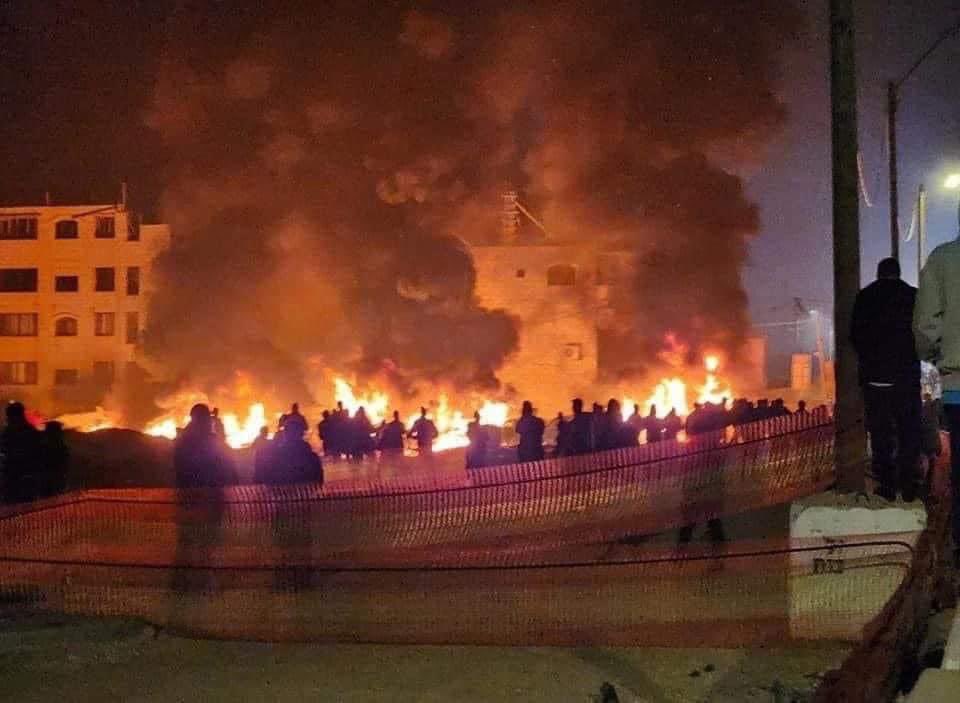
'Our lives are in danger'
One Huwwara resident, Ziyad Dmaidi, told MEE that he barely got his family to safety before his home was set on fire.
Dmaidi was returning from work when he saw a group of settlers heading towards his house, he said, recalling a feeling of panic as he rushed inside to gather his family.
Within minutes "dozens of settlers" began smashing in windows, breaking into the house. The family escaped just as burning rubber tyres were thrown inside. His home was completely destroyed.
"I never thought about the house or all our stuff, I was only thinking about my children and how to save them from this nightmare," Dmaidi said.
"We got out of the house and off to safety with the help of the ambulance crews who were also attacked while trying to evacuate us.
"Our lives are in danger and all this is happening while the Israeli soldiers stand around waiting only to protect the settlers," he continued.
Fida Hamad, another resident, told MEE that the settlers' attack was the largest she had ever experienced and that houses were set on fire with families still inside.
Large clouds of smoke billowed throughout the town to the constant sounds of screaming, she said.
"We were sitting in our homes, and suddenly we heard explosions and screams of panic. We learnt that the settlers had attacked the town," Hamad recalled.
"My children started crying and I tried to calm them down, but the sounds of assault were louder than everything: swearing in Hebrew, smashing windows, burning vehicles, homes, and shops ... It was very terrible."
Palestinian Prime Minister Mohammad Shtayyeh charged the Israeli government with full responsibility for the attacks in Huwwara and urged the international community to provide protection to the civilian population.
Meanwhile, Aida Touma-Suleiman, a Palestinian member of the Israeli parliament, condemned the attacks, tweeting: "The settlers are committing a horrific crime tonight in Huwwara - burning homes while families are inside and wreaking havoc.
"They are acting in the spirit of the fascist government," Touma-Suleiman said. "I spoke to several ambassadors and asked them to intervene.
Settlers 'seek revenge'
Earlier on Sunday, Hillel and Yagel Yaniv, two brothers from Har Bracha, an illegal settlement in the occupied West Bank, were fatally shot in their car while driving through Huwwara.
The assailant rammed the vehicle, before shooting at the two and fleeing the scene. Just after the shooting, Israel's military said it was pursuing the perpetrator.
Israeli settlers issued calls to organise a march to Huwwara on social media to "seek revenge" for the attacks.
"Israeli settlers have been terrorising the Palestinian communities today, in the occupied West Bank, attacking civilians and torching down houses and businesses," the official account of the Palestinian mission to the UK tweeted, sharing a video of one of the fires and tagging Foreign Secretary James Cleverly and two Foreign Office Twitter accounts.
The occupied West Bank is home to about 2.9 million Palestinians as well as an estimated 475,000 Jewish settlers who live in state-approved settlements that are illegal under international law.
Nearly 400 Palestinians are wounded while scores of homes, shops and cars are destroyed

A Palestinian woman stands outside a house burnt in an attack by Israeli settlers in Huwwara (Reuters)
By Fayha Shalash , Sheren Khalel
Published date: 26 February 2023
Ramallah, occupied Palestine - Israeli settlers rampaged through towns in the occupied West Bank on Sunday evening in revenge attacks, burning and attacking Palestinian homes and property for hours.
At least one Palestinian was killed and nearly 400 wounded in the attacks, Palestinian health officials said.
Sameh Hamdullah Aktech, 37, was shot dead in Za'tara town near Nablus. The Palestine Red Crescent Society (PRCS) said its staff treated someone for stabbing wounds and at least two others suffered head injuries.
Homes, shops, cars and agricultural land were set ablaze by settlers who roamed the streets of several Palestinian towns, mainly near Nablus. Attacks were reported in Ramallah and Salfit.
PRCS said at least 35 homes were completely burned down and 40 others were partially damaged. More than 100 cars were burnt or destroyed, it added.
The riots followed a shooting earlier in Huwwara town earlier in the day by a suspected Palestinian which left two Israeli settlers killed.

An image shared on Twitter of the chaotic scene in the northern West Bank town of Huwwara during an attack organised by Israeli settlers following an earlier fatal shooting (Twitter)
Ghassan Daghlas, a Palestinian activist monitoring the expansion of Israeli settlements in the northern West Bank, told Middle East Eye at least one shop was burned down as of 9:15pm local time.
"What the settlers are doing tonight are war crimes similar to the events of the Nakba and the attacks of the Zionist gangs," Daghlas said, referring to the violent "catastrophe" of 1948 that lead to the creation of the State of Israel.
Nine Palestinian families have had to be rescued from their burning homes, Israel's Channel 12 news reported.
Ghassan Daghlas, a Palestinian activist monitoring the expansion of Israeli settlements in the northern West Bank, told Middle East Eye at least one shop was burned down as of 9:15pm local time.
"What the settlers are doing tonight are war crimes similar to the events of the Nakba and the attacks of the Zionist gangs," Daghlas said, referring to the violent "catastrophe" of 1948 that lead to the creation of the State of Israel.
Nine Palestinian families have had to be rescued from their burning homes, Israel's Channel 12 news reported.
'Our lives are in danger'
One Huwwara resident, Ziyad Dmaidi, told MEE that he barely got his family to safety before his home was set on fire.
Dmaidi was returning from work when he saw a group of settlers heading towards his house, he said, recalling a feeling of panic as he rushed inside to gather his family.
Within minutes "dozens of settlers" began smashing in windows, breaking into the house. The family escaped just as burning rubber tyres were thrown inside. His home was completely destroyed.
'Sounds of assault were louder than everything: swearing in Hebrew, smashing windows, burning ... It was very terrible'- Fida Hamad, Huwwara resident
"I never thought about the house or all our stuff, I was only thinking about my children and how to save them from this nightmare," Dmaidi said.
"We got out of the house and off to safety with the help of the ambulance crews who were also attacked while trying to evacuate us.
"Our lives are in danger and all this is happening while the Israeli soldiers stand around waiting only to protect the settlers," he continued.
Fida Hamad, another resident, told MEE that the settlers' attack was the largest she had ever experienced and that houses were set on fire with families still inside.
Large clouds of smoke billowed throughout the town to the constant sounds of screaming, she said.
"We were sitting in our homes, and suddenly we heard explosions and screams of panic. We learnt that the settlers had attacked the town," Hamad recalled.
"My children started crying and I tried to calm them down, but the sounds of assault were louder than everything: swearing in Hebrew, smashing windows, burning vehicles, homes, and shops ... It was very terrible."
Palestinian Prime Minister Mohammad Shtayyeh charged the Israeli government with full responsibility for the attacks in Huwwara and urged the international community to provide protection to the civilian population.
Meanwhile, Aida Touma-Suleiman, a Palestinian member of the Israeli parliament, condemned the attacks, tweeting: "The settlers are committing a horrific crime tonight in Huwwara - burning homes while families are inside and wreaking havoc.
"They are acting in the spirit of the fascist government," Touma-Suleiman said. "I spoke to several ambassadors and asked them to intervene.
At least one Palestinian fire truck attempting to respond to the fires was attacked and its windows smashed. Several ambulances were also damaged, according to reports on social media. PRCS said they were prevented from reaching areas affected by the attacks in Huwwara for two hours.
Settlers 'seek revenge'
Earlier on Sunday, Hillel and Yagel Yaniv, two brothers from Har Bracha, an illegal settlement in the occupied West Bank, were fatally shot in their car while driving through Huwwara.
The assailant rammed the vehicle, before shooting at the two and fleeing the scene. Just after the shooting, Israel's military said it was pursuing the perpetrator.
Israeli settlers issued calls to organise a march to Huwwara on social media to "seek revenge" for the attacks.
"Israeli settlers have been terrorising the Palestinian communities today, in the occupied West Bank, attacking civilians and torching down houses and businesses," the official account of the Palestinian mission to the UK tweeted, sharing a video of one of the fires and tagging Foreign Secretary James Cleverly and two Foreign Office Twitter accounts.
The occupied West Bank is home to about 2.9 million Palestinians as well as an estimated 475,000 Jewish settlers who live in state-approved settlements that are illegal under international law.
Israeli Prime Minister Benjamin Netanyahu released a joint statement following Sunday's initial shooting, announcing that parliament had passed legislation approving the death penalty for Palestinians convicted of terrorism offences against Israelis.
"On this difficult day when two Israeli citizens were murdered in a Palestinian terrorist attack, there is nothing more symbolic than passing a death penalty law for terrorists," the statement read.
Earlier on Sunday, Israeli and Palestinian officials held talks in Jordan to try to secure calm in the West Bank and the Gaza Strip.
At least 62 Palestinians have been killed by Israelis this year, at a rate of more than one fatality per day. Meanwhile, 12 Israeli civilians and one police officer have been killed by Palestinians in the same period.
This follows a steep increase in violence in 2022 when at least 167 Palestinians were killed in the West Bank and East Jerusalem, the highest death toll in those territories in a single year since the Second Intifada. Palestinian attacks killed 30 Israelis last year.
Fayha Shalash reported from Ramallah and Sheren Khalel from Florida.
This article is available in French on Middle East Eye French edition.
"On this difficult day when two Israeli citizens were murdered in a Palestinian terrorist attack, there is nothing more symbolic than passing a death penalty law for terrorists," the statement read.
Earlier on Sunday, Israeli and Palestinian officials held talks in Jordan to try to secure calm in the West Bank and the Gaza Strip.
At least 62 Palestinians have been killed by Israelis this year, at a rate of more than one fatality per day. Meanwhile, 12 Israeli civilians and one police officer have been killed by Palestinians in the same period.
This follows a steep increase in violence in 2022 when at least 167 Palestinians were killed in the West Bank and East Jerusalem, the highest death toll in those territories in a single year since the Second Intifada. Palestinian attacks killed 30 Israelis last year.
Fayha Shalash reported from Ramallah and Sheren Khalel from Florida.
This article is available in French on Middle East Eye French edition.
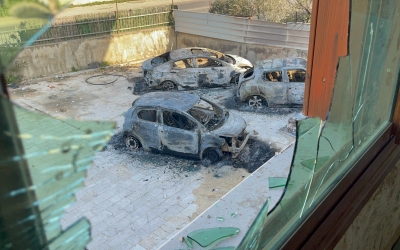
No comments:
Post a Comment